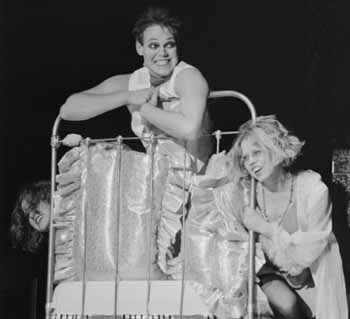Wilkommen
If I had to sum up Utah State Theater’s production of “Cabaret” with one word it would have to be timid.
“Cabaret” is an intense, thought-provoking show – one where you aren’t sure if it is appropriate to clap at the end or not. The show’s subject matter runs the gambit from the Nazi Party to homosexuality to abortion to total and absolute freedom.
The characters of the show – specifically the British songbird Sally Bowles (played by Melanie Rees) and the American writer Clifford Bradshaw (played by Dustin Jay Siler) are swept up in the lifestyle of “divine decadence” and “delicious sin” until they are forced to deal with the realities slowly eroding away the facade of their life perpetuated by the overindulgence represented by the Kit Kat Klub.
Through it all, the Emcee (played by Eric VanTielen) presides as the master of all. He is both the embodiment of the club and the time period, as well as a catalyst for the action. He is a little Shakespearean Chorus and a little George Orwellish in his ability to penetrate the thoughts of the characters and expose them for the audience’s pleasure or horror.
The Romeo and Juliet relationship of Fräulein Schneider and Herr Schultz only emphasizes the horrors Cliff slowly begins to discover as the selfish nature of the lives of the Kit Kat’s denizens foreshadow the ideals of Hitler’s Germany.
UST’s production, however, was a watered-down, Loganized version of the show and the freedoms it embodies. Granted, it is probably more appropriate in this form for the Utah State University audience members who aren’t able to look past the blatant sexuality displayed by the characters to understand the show’s undertones.
Don’t get me wrong, I enjoyed the performance, and laud it as perhaps the best show I have seen performed at USU. The set designed by Stuart Lewis was simple yet complex in its depth. The lighting perfectly accentuated the moods of the show swelling with warmth or chilling the action as needed.
The humor was there. At times it was a bit rushed or hidden, but the jokes are there for the finding. The cast just wasn’t making it easy for the audience to enjoy them in most cases.
The inherent humor in Two Ladies does shine through brilliantly culminating with the Emcee’s tousled-haired appearance. The very idea of that kind of relationship is one of the forbidden pleasures balancing out “Cabaret’s” thought-provoking stimuli with the need to nervously giggle about forbidden fantasies.
The actors attempted to portray their sexual freedom, yet it was hard to take them seriously in their half-hearted (maybe restrained) attempts to embody the lifestyle of the sleazy 1930s’ lifestyle. Every once and while a clear glimpse of the Kit Kat Klub would emerge, and I would rejoice in this vision of what might have been.
Colors seemed to play a big part in the costumes of the show. This is a bit unfortunate since they tended to make light of the underworld atmosphere. In Wilkommen, the opening number, Sally Bowles, the star of the club, is lost amid the purples, greens and blues of the other actors to become just another face in the crowd.
The action and emotion of many of the numbers such as Don’t Tell Mama and It Couldn’t Please Me More were lost in a stage overcluttered with characters who drew attention away from what should have been the focus.
The choreography seemed to be a forced ballet of frenetically waving arms and forgotten steps instead of the base, driving undulating found in an underground club where anything goes. The dancing was spontaneous musical theater and not integrated showmanship.
Perhaps the most disappointing was the lack of emotion and build in the first act’s closing number, Tomorrow Belongs to Me. The tension was prevalent in the staging, but the sheer fury of Fräulein Kost and the haughty aloofness of Ernst Ludwig were sorely missed to drive the point home.
Thankfully Cliff’s disgust and Sally’s casual disregard for the situation survive to help the audience clue in to the loss of their innocence and the upheaval into which their world has been thrown. “Cabaret” is about becoming aware of who you are, recognizing that people around you can and will influence you and learning exactly how crazy this world we live in really is.
It is a show about loving the unlovable, hating the innocent, losing that which is most precious and above all learning that where you end up in life is sometimes the place you have been striving so hard to get away from. But most of all it is about learning to deal with the consequences or choices forced upon us. It is learning about the slavery of freedom.
Still, “Cabaret” as directed by Adrianne Moore will survive as the crowning jewel of this year’s theater season. Enjoy the beauty and depth of Joe Masteroff’s book and the songs by John Kander and Fred Ebb. Don’t leave at the first sign of something that may seem offensive. Look past the actions to see the motives and the ultimate sadness of the way life can swing.
If nothing else, use it as a chance to evaluate your own life and where your choices have led you. Are you satisfied that life is a cabaret or do you really not care much either way? Wake up and smell the pineapple and go ahead, leave your troubles outside. They may be there waiting again when you leave the show, but they just may seem a bit smaller than when you went in.

Texas (Brook Pulver), the Emcee (Eric VanTielen) and Maria (Katie Ackerman) sing about the joys of having “Two Ladies” during ´Cabaret´ now playing in the Morgan Theatre. (Zak Larsen )

